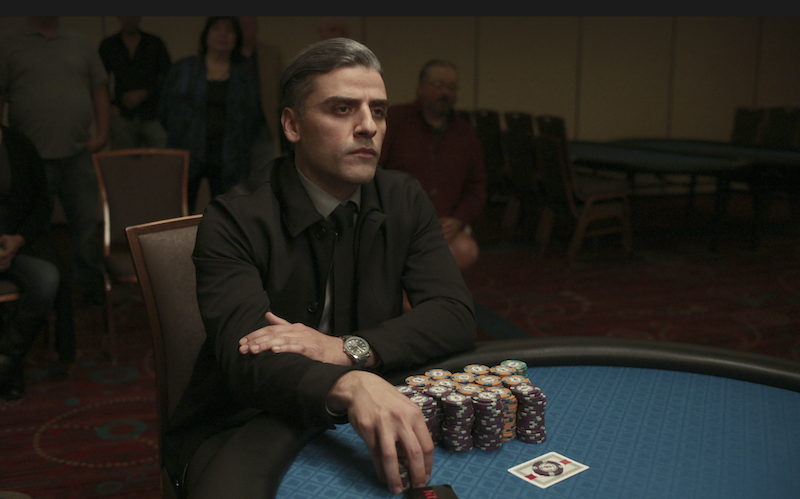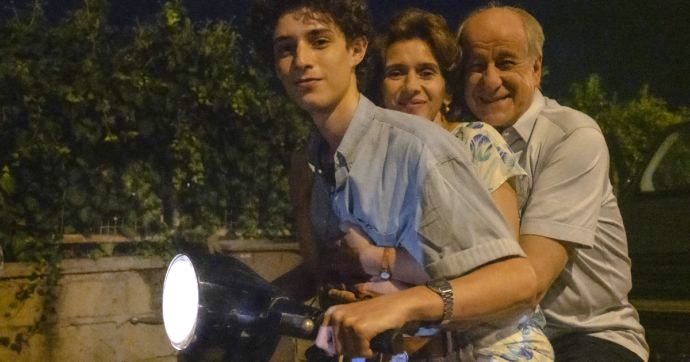Elisa's Venice Diary #2: Lost Daughter and lost souls: Sorrentino, Schrader and Gyllenhaal
 Saturday, September 4, 2021 at 3:30PM
Saturday, September 4, 2021 at 3:30PM by Elisa Giudici

Day two, three movies: a luxury, considering how difficult it is to get tickets this year. Usually, the Venice way is to queue outside the screening hoping to be able to get inside. If you have a red or blue pass you are reasonably sure to see everything you want, even when you arrive only 5 minutes before the beginning of the show. If you are a green or yellow pass holder, you need to show up early and hope red or blue pass holders are busy somewhere else. Due to Covid-19 safety rules and social distancing, only one-third of available seats can be occupied. It means you have to be really quick to book a seat online, 74 hours before the show. The hot movies sold out in mere seconds so I am incredibly lucky to be able to review three major movies from the main competition today.

The Card Counter (Paul Schrader)
Knowing how austere and morally inflexible Paul Schrader is about cinema (and life) I think The Card Counter is his most accessible recent movie by pure accident. I really enjoyed it and I think the general public will like this thriller about poker, gambling, and the casino world...
The gambling side of the film is something between Molly's Game and The Cincinnati Kid (which is directly quoted in the movie). Underneath the gambling surface lies the real deal: the prototypical Paul Schrader protagonist. William Tell (Oscar Isaac) is a lone man dealing with an unbearable moral weight on his conscience, trying to save a younger version of himself from committing the same mistakes. Unlike First Reformed's protagonist, William Tell has actually done something almost unspeakable in his past. Though he spent years in prison for his crime he is unable to forgive himself and scarred by the experience. Prison proved a safe space for him, where the routine and the confinement helped him to fight the chaos of his past and taught him "how to read a book to the very end and to count cards". Oscar Isaac is superb here as a player with an impenetrable poker face, but also a man dealing with trauma. As usual, Schrader's writing is deep and profound enough that it made me want to write down every other sentence in the movie. I also appreciate how The Card Counter revolves around a crime whose responsibility is on the shoulder of an entire nation (USA), yet filtered by the experience of a single individual. I don't dare define William Tell as a scapegoat, but I was quite impressed how Schrader is able to make the audience connect to the human side of a character with this many shadows in him.

È stata la mano di Dio / Hand of God (Paolo Sorrentino)
I'm happy to report that the latest Sorrentino is his best movie since Il Divo (2008). I really enjoyed Sorrentino's filmography pre-The Great Beauty. Back then he was a more consistent, less digressive filmmaker. His new film is set in Naples during the '80s when Diego Armando Maradona joined Napoli Football Club and helped it win its first Italian Football League. È stata la mano di Dio is almost a Neapolitan, heterosexual version of Call Me by Your Name. The movie is a coming of age of a young soccer fan named Fabietto, who is living a carefree life full of love and laughter with his parents and relatives. The first half of the movie is so joyous and fun that the turning point of the film is a real blow to both Fabietto and the audience. Suddenly, Fabietto is required to become an adult and to decide what to do with his own life: cinema is the answer.
The plot of the film feels quite autobiographical -- Maradona, Naples vs Rome, strange muses, and love for cinema (Fellini in particular) are all cards from Sorrentino's familiar deck. Sometimes his cinema can be a little pretentious, but it helps that this one is a personal story of home and family. It is easy to be enthralled by it and to envy the amazing relationship between Fabietto's parents (played by Toni Servillo and Teresa Saponangelo). If Sorrentino doesn't take the big Venice prize for the movie itself, the young actor Filippo Scotti could well win the Marcello Mastroianni prize. The only mistake here was casting Luisa Ranieri as the auntie and muse of the protagonist: I find that her acting skills are not on the same level as the rest of the impressive Italian (almost all Neapolitan) cast. A finale note: be prepared for a very, very weird "first time" sex scene.

The Lost Daughter (Maggie Gyllenhaal)
Olivia Colman is absolutely stunning in Maggie Gyllenhaal's directorial debut. Gyllenhaal's camera follows Colman closely in every scene, catching all of her little, revealing changes of expression with close-ups and a handheld camera. It's easy to picture an Oscar nomination for Colman especially since there is a lot to discover about her character. Lidia Caruso is a university professor who is spending her summer holidays in Greece. She's the 48 year old mother of two grown-up daughters, and also a single woman trying to enjoy her vacation. That quick portrait sketch sounds conventional enough that you can hardly imagine any secrets under the surface of this woman enjoying herself by the sea. But Lidia is a character from one of Elena Ferrante's novels, so she hides a lot. Woman and mother are complex, contradictory roles to play in society, and sooner or later any female protagonist feels the pressure of these two labels on herself. Ferrante is able to capture how simplistic it is to consider each and every mother as a creature with an unlimited amount of maternal instinct and love for her own demanding children, who are their own complex human beings in the making. Every day at the beach Lidia watches the young Nina (Dakota Johnson) struggling to be a good mother to her toddler daughter, while remembering when she herself was in the same shoes. In another movie Lidia would probably be a sympathetic creature helping Nina with no reservations, but not in Elena Ferrante's adaption. Gyllenhaal relies on Ferrante's vision: the best parts of the movie stick closely to the original material. The cast is gorgeous, the story is quite slow at first but able to build tension following Lidia's contradictory actions regarding Nina in the present and her own daughters in the flashbacks.
The only limit of the movie is Maggie Gyllenhaal directing style. She is quite good at translating Ferrante's writing to the big screen, but she tends to disappear inside her own directorial debut. It made me think of Mario Martone's L'amore Molesto (1995), the first adaptation from a novel by the Italian writer that arrived on the big screen. Martone was able to transform Ferrante's novel into a story he owned: I am unsure Maggie Gyllenhaal has obtained the same result.
More Venice coverage
- Elisa's Diary #1 Parallel Mothers and Power of the Dog
- Elisa's Diary #2 The Card Counter, Hand of God, The Lost Daughter
- Elisa's Diary #3 Spencer, A Plein Temps, Il Buco
- Eiisa's Diary #4 Sundown, Official Competition, etc...
- Elisa Extra Dune - full review
- Elisa's Diary #5 L'Evenement, Lost Illusions, Mona Lisa...
- Elisa's Diary #6 Reflection, Captain Volkonoff Escaped, Old Henry, etc...
- Nathaniel in Venice #1 Parallel Mothers
- Nathaniel in Venice #2 Power of the Dog, Madeleine Collins
- Nathaniel in Venice #3 Atlantide, Les Promesses, The Lost Daughter
- Nathaniel in Venice #4 107 Mothers, Official Competition, Miracle, etc...
- Nathaniel in Venice #5 Last Night in Soho, Mona Lisa and the Blood Moon
- Nathaneil in Venice #6 Catholic School, A Hole in the Fence, La Caja



Reader Comments (3)
I'm so happy and excited for Oscar Isaac and Olivia Colman! Not even just for awards purposes but just getting these juice roles and flexing their skills and people loving it. It's good when great actors get great roles and are appreciated for it!
Oscar Isaac is one of my favorite actors, but it felt like his promising career got lost somehow after took the Star Wars role, so I'm excited to see his promising projects this fall. First Reformed was one of my favorite movies of the last decade; it'll be interesting to see what Schrader has next in store.
Colman is always great; I won't miss anything she does.
Intrigued by THE CARD COUNTER though also curious how Tiffany Haddish fares in something so different from her previous filmography. Like others, hope this brings Oscar Isaac back into serious awards conversation.